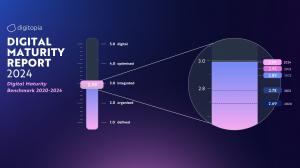Digital transformation remains a top priority for executives, yet progress is slowing— average digital maturity rising from 2.69 in 2020 to 2.99 in 2024.
This report offers the clarity, urgency, and tools leaders need to make digital transformation real—and impactful.”
NEW YORK, NY, UNITED STATES, April 18, 2025 /EINPresswire.com/ -- While digital transformation remains high on executive agendas, Digitopia’s newly released Digital Maturity Report 2024 paints a more sobering picture: progress is losing momentum, execution gaps are widening, and the divide between digital leaders and laggards is growing ever more pronounced.— Peter Sondergaard
Based on over 1,300 assessments across 20 countries and 10 industries, and enriched by the insights of 30,000+ senior executives, the report provides one of the world’s most comprehensive views on the true state of digital transformation. From culture and leadership to technology, data, and execution, the study explores the critical factors that distinguish high-performing organizations from those at risk of falling behind.
“Digital maturity is not just a score. It’s a mirror that reflects the true state of your transformation efforts,” says Peter Sondergaard, renowned tech strategist and former EVP at Gartner.
“This report offers the clarity, urgency, and tools leaders need to make digital transformation real—and impactful.”
The findings show that while average digital maturity has increased from 2.69 in 2020 to 2.99 in 2024, the rate of progress has slowed. Organizations are hitting a wall—not due to lack of ambition, but due to growing complexity, competing priorities, and cultural inertia.
Industries such as Banking and Manufacturing are leading the charge, with top performers reaching scores above 4.0. In contrast, sectors like Services and Consumer Goods remain below the global average, facing structural and cultural barriers to change.
The report also highlights that as companies advance in their digital maturity, integration becomes increasingly difficult. Aligning people, processes, and governance requires not just technology, but visionary leadership and strategic discipline.
At the heart of the report lies the transformative power of Artificial Intelligence (AI). Companies that embrace AI not only improve efficiency but unlock entirely new ways of operating and innovating. For organizations still hesitating, the message is clear: AI is no longer optional—it’s essential.
The report urges organizations to adopt a more holistic approach to digital transformation—moving beyond fragmented digital initiatives toward integrated strategies that align efforts across all functions. To succeed, companies must also demonstrate bold leadership, acting decisively and committing to meaningful change rather than falling back on outdated models. In this new landscape, competitive advantage will belong to those who can fully leverage AI and data-driven decision-making, using continuous measurement to drive strategic clarity and innovation.
Ultimately, Digitopia's Digital Maturity Report 2024 serves as a vital compass for companies navigating the complexities of transformation in the AI era. With in-depth benchmarks, clear trends, and actionable insights, it provides leaders with the guidance they need to succeed in an increasingly digital world.
For more detailed information and to download the full report, please click here.
Kardelen Çelik
Digitopia
+90 546 760 33 03
email us here
Visit us on social media:
Facebook
X
LinkedIn
Instagram
YouTube
Legal Disclaimer:
EIN Presswire provides this news content "as is" without warranty of any kind. We do not accept any responsibility or liability for the accuracy, content, images, videos, licenses, completeness, legality, or reliability of the information contained in this article. If you have any complaints or copyright issues related to this article, kindly contact the author above.



